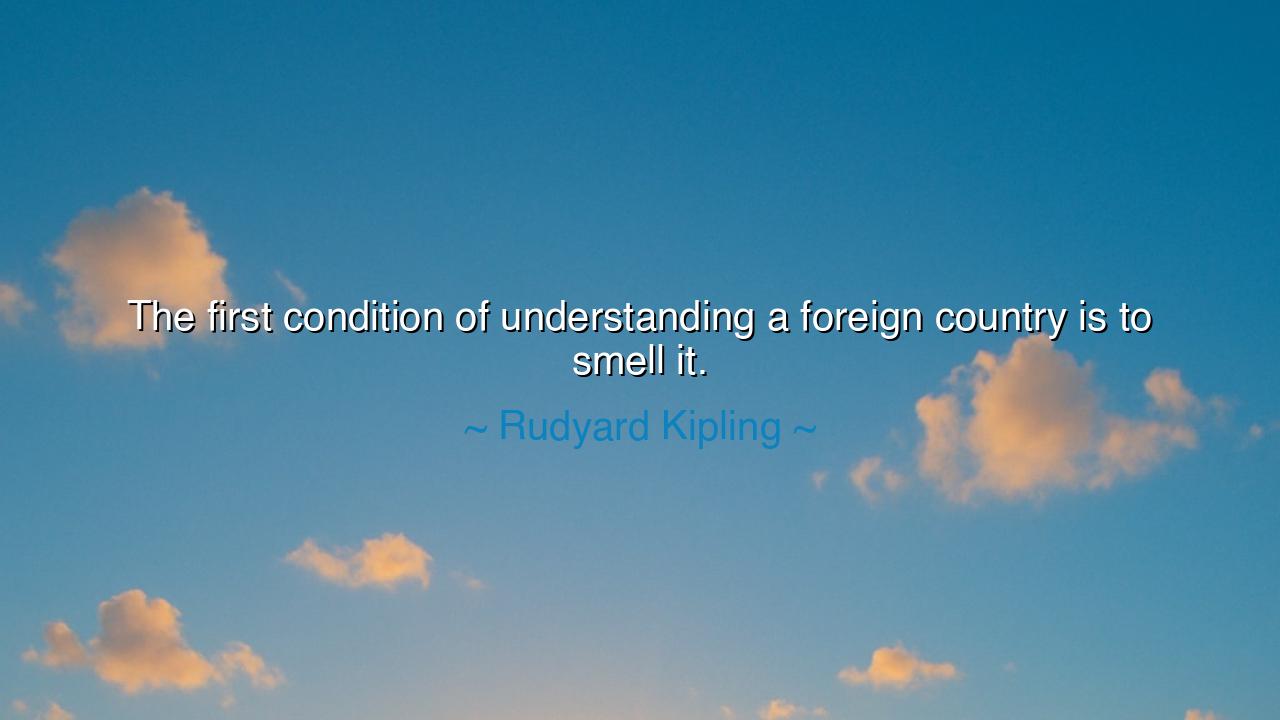
The first condition of understanding a foreign country is to






Hear the vivid words of Rudyard Kipling: “The first condition of understanding a foreign country is to smell it.” At first, his saying may strike the ear as curious, but it holds within it a truth both primal and profound. For Kipling, who wandered the wide empire and knew the touch of distant lands, understood that to truly know a place, one must go beyond maps, books, and the mere sight of monuments. One must enter into its very essence—the air that clings to its markets, the spices that rise from its kitchens, the dust that lingers on its streets, the smoke of its hearths. These are not seen but smelled, and through them the soul of a people is revealed.
For what is smell but the most intimate of the senses, the one that binds us to memory and instinct? A glance may deceive, and words may mislead, but the scent of a place cannot be hidden. It is the sum of its soil, its food, its climate, its life. To inhale is to take the land itself into one’s body. Thus Kipling teaches: before you can claim to understand, you must breathe deeply, you must let the unseen yet undeniable truth of the place enter into your spirit.
The ancients knew this well. In the sacred rites of Egypt, incense was burned not merely as offering, but as a way of uniting gods and men in the shared fragrance of sanctity. In India, from where Kipling drew much of his inspiration, spices were not only for taste but for life itself—the air was thick with cardamom, turmeric, and clove, each carrying with it centuries of tradition. The foreign country is not only to be seen with the eyes; it is to be known through the senses, and foremost among them is the primal sense of smell.
History gives us many lessons in this truth. When Marco Polo entered the markets of Cathay, what struck him was not only the silks he saw, but the fragrance of tea, the aroma of strange herbs and resins. When the caravans crossed into Arabia, it was the scent of frankincense and myrrh that told the traveler he was no longer in his own land. And when sailors returned from the Indies, Europe was forever changed not by what they described, but by the spices they brought back, which carried the very spirit of foreign lands. Indeed, the smell of a country often preceded its story.
Yet Kipling’s words hold not only literal meaning, but metaphor as well. To “smell” a land is to immerse oneself fully, to enter its rhythm without fear or barrier. It is to abandon the sterile distance of the observer and to become, for a moment, a participant. To truly know another culture, you must walk its streets, taste its food, breathe its air. It is not enough to observe from afar, or to read descriptions in books. Understanding begins with contact—with senses awakened, with self exposed.
The lesson for us is clear: do not approach the foreign country as a mere tourist of the eyes, snapping photographs and ticking boxes. Approach as one who longs to understand, to absorb, to be changed. Smell the bread as it is baked in the morning, the incense in temples, the rain striking unfamiliar earth. Let these become your teachers. For the first step to true knowledge is not intellectual pride, but sensory humility—the willingness to receive.
Practically, this means: when you travel, do not insulate yourself from the life of the place. Do not hide behind hotels that smell like nowhere. Instead, go into the markets, the kitchens, the gardens. Smell the earth after the storm, the flowers of the season, the fires of the street vendors. These are the invisible keys to a nation’s heart. And even at home, when meeting those from abroad, learn to honor the scents of their traditions, for in them lives memory and identity.
Therefore, O seekers of wisdom, remember Kipling’s teaching. The first condition of understanding is not thought, but breath. To know the world, you must inhale it, you must allow its unseen essence to pass into you. Sight may delight, sound may charm, but smell binds the traveler to the truth of place. Breathe deeply, then, wherever you go, and let the world itself become your teacher—subtle, unseen, but unforgettable.






AAdministratorAdministrator
Welcome, honored guests. Please leave a comment, we will respond soon